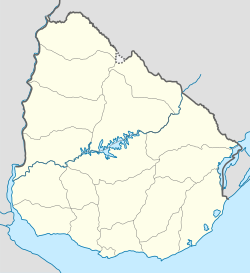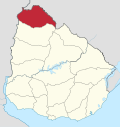Artigas, Uruguay
Artigas | |
|---|---|
Capital city | |
 Church of the Sacred Heart | |
| Coordinates: 30°28′0″S 56°28′0″W / 30.46667°S 56.46667°W | |
| Country | |
| Department | |
| Founded | September 12, 1852 |
| Founded by | Don Carlos Catalá |
| Elevation | 121 m (397 ft) |
| Population (2011 Census) | |
• Total | 40,658 |
| Demonym | artiguense |
| Time zone | UTC−3 (UYT) |
| postal code | 55000 |
| Dial plan | +598 477 (+5 digits) |
| Climate | Cfa |
Artigas (Spanish pronunciation: [aɾˈtiɣas]) is the capital of the Artigas Department of Uruguay. Its name comes from that of the national hero, José Gervasio Artigas, who fought for the emancipation of the River Plate, and sought to create a federative nation from these colonies. As of the census of 2011, it is the eleventh most populous city in the country.
History
[edit]It was founded on 12 September 1852 by Don Carlos Catalá as the town of San Eugenio del Cuareim. On 5 September 1884 it became capital of the department. It was renamed Artigas and its status was elevated from villa (town) to ciudad (city) on 31 August 1915.[1]
Economy
[edit]Artigas is a centre for trading grain crops (primarily maize) with Argentina and Brazil. The railroad station and, since 1973, airport are focused on this commerce.
The hills in the area contain significant numbers of precious stones, especially agate and amethyst, which were first found in 1860, since when mining has taken place. Souvenirs and handicrafts made using these gem stones are produced in Artigas and exported widely.
IUGS geological heritage site
[edit]In respect of it being 'the site of world-class amethyst deposits, where the largest amethyst-filled giant geodes were ever found', the International Union of Geological Sciences (IUGS) included the 'Deposits of Amethyst of Los Catalanes Gemological District' in its assemblage of 100 'geological heritage sites' around the world in a listing published in October 2022. The organisation defines an IUGS Geological Heritage Site as 'a key place with geological elements and/or processes of international scientific relevance, used as a reference, and/or with a substantial contribution to the development of geological sciences through history.'[2]
Population
[edit]In 2011 Artigas had a population of 40,658.[3]
| Year | Population |
|---|---|
| 1852 | 335 |
| 1908 | 8,857 |
| 1963 | 23,429 |
| 1975 | 29,256 |
| 1985 | 35,117 |
| 1996 | 40,244 |
| 2004 | 41,687 |
| 2011 | 40,658 |
Source: Instituto Nacional de Estadística de Uruguay[1]
Geography
[edit]The city is located on the border with Brazil, separated only by a bridge from the town Quaraí of the state Rio Grande do Sul of Brazil. It is the farthest city from Uruguay's capital Montevideo, being 600 kilometres (370 mi) away.
Climate
[edit]Artigas has a humid subtropical climate, described by the Köppen climate classification as Cfa. Summers are warm to hot and winters are cool, with the occurrence of frosts and fog. The precipitation is evenly distributed throughout the year, with an average of roughly 1,535 mm (60.4 in), and the annual average temperature is around 19.6 °C (67.3 °F).[4]
| Climate data for Artigas, Uruguay (1991–2020, extremes 1944–2020) | |||||||||||||
|---|---|---|---|---|---|---|---|---|---|---|---|---|---|
| Month | Jan | Feb | Mar | Apr | May | Jun | Jul | Aug | Sep | Oct | Nov | Dec | Year |
| Record high °C (°F) | 40.9 (105.6) |
41.2 (106.2) |
40.8 (105.4) |
36.0 (96.8) |
33.0 (91.4) |
30.2 (86.4) |
30.5 (86.9) |
34.4 (93.9) |
37.0 (98.6) |
37.4 (99.3) |
40.8 (105.4) |
41.4 (106.5) |
41.4 (106.5) |
| Mean daily maximum °C (°F) | 32.2 (90.0) |
31.1 (88.0) |
29.4 (84.9) |
25.7 (78.3) |
21.5 (70.7) |
19.2 (66.6) |
18.7 (65.7) |
21.1 (70.0) |
22.4 (72.3) |
25.0 (77.0) |
28.0 (82.4) |
30.8 (87.4) |
25.4 (77.8) |
| Daily mean °C (°F) | 25.8 (78.4) |
25.0 (77.0) |
23.3 (73.9) |
19.9 (67.8) |
16.2 (61.2) |
14.0 (57.2) |
13.3 (55.9) |
15.2 (59.4) |
16.7 (62.1) |
19.4 (66.9) |
21.7 (71.1) |
24.3 (75.7) |
19.6 (67.2) |
| Mean daily minimum °C (°F) | 19.4 (66.9) |
18.9 (66.0) |
17.3 (63.1) |
14.2 (57.6) |
10.9 (51.6) |
8.9 (48.0) |
7.9 (46.2) |
9.3 (48.7) |
11.0 (51.8) |
13.8 (56.8) |
15.5 (59.9) |
17.9 (64.2) |
13.8 (56.7) |
| Record low °C (°F) | 8.2 (46.8) |
7.9 (46.2) |
5.0 (41.0) |
1.8 (35.2) |
−3.0 (26.6) |
−4.6 (23.7) |
−5.2 (22.6) |
−4.3 (24.3) |
−2.8 (27.0) |
1.2 (34.2) |
3.0 (37.4) |
6.0 (42.8) |
−5.2 (22.6) |
| Average precipitation mm (inches) | 142.8 (5.62) |
137.0 (5.39) |
118.4 (4.66) |
180.1 (7.09) |
136.2 (5.36) |
92.1 (3.63) |
80.2 (3.16) |
65.4 (2.57) |
119.5 (4.70) |
158.3 (6.23) |
150.2 (5.91) |
155.2 (6.11) |
1,535.4 (60.43) |
| Average precipitation days (≥ 1.0 mm) | 7 | 7 | 6 | 8 | 6 | 6 | 6 | 6 | 7 | 8 | 7 | 7 | 81 |
| Average relative humidity (%) | 61 | 68 | 70 | 72 | 77 | 79 | 75 | 70 | 69 | 69 | 65 | 61 | 70 |
| Mean monthly sunshine hours | 276.7 | 231.8 | 233.1 | 188.7 | 168.3 | 138.7 | 164.4 | 198.2 | 192.2 | 217.3 | 262.7 | 274.7 | 2,546.8 |
| Source 1: Instituto Uruguayo de Metereología[4][5] | |||||||||||||
| Source 2: NOAA (precipitation and sun 1991–2020),[6] Instituto Nacional de Investigación Agropecuaria (humidity 1980–2009)[7] | |||||||||||||
Transportation
[edit]The city uses Artigas International Airport.
Consular representation
[edit]Brazil has a Vice-consulate in Artigas.[8]
Places of worship
[edit]- San Eugenio del Cuareim, Artigas|St. Eugene of the Cuareim Parish Church (Roman Catholic)
Notable people
[edit]- Adelia Silva (1925–2004), educator and writer who had a significant role in elevating the civil rights of black people in Uruguay.[9]
- Darwin Núñez (born 1999), footballer
- Pablo Aurrecochea (born 1981), footballer
- Agustín Da Silveira (born 2000), footballer
References
[edit]- ^ a b "Statistics of urban localities (1852–2004) (see also "San Eugenio del Cuareim")". INE. 2012. Archived from the original (PDF) on 23 March 2015. Retrieved 3 September 2012.
- ^ "The First 100 IUGS Geological Heritage Sites" (PDF). IUGS International Commission on Geoheritage. IUGS. Retrieved 13 November 2022.
- ^ "Censos 2011 Cuadros Artigas". INE. 2012. Retrieved 25 August 2012.
- ^ a b "Estadísticas climatológicas" (in Spanish). Dirección Nacional de Meteorología. Retrieved 16 May 2023.
- ^ "RECORDS METEOROLOGICOS EN EL URUGUAY" (in Spanish). Dirección Nacional de Meteorología. Retrieved 16 May 2023.
- ^ "Artigas Climate Normals 1991–2020". World Meteorological Organization Climatological Standard Normals (1991–2020). National Oceanic and Atmospheric Administration. Archived from the original on 7 August 2023. Retrieved 7 August 2023.
- ^ Castaño, José; Giménez, Agustín; Ceroni, Mauricio; Furest, José; Aunchayna, Rossina. "Caracterización Agroclimática del Uruguay 1980–2009" (PDF) (in Spanish). Instituto Nacional de Investigación Agropecuaria. Archived from the original (PDF) on 12 December 2018. Retrieved 12 December 2018.
- ^ "Vice-Consulado do Brasil em Artigas". Ministério das Relações Exteriores (in Portuguese). Retrieved 13 June 2022.
- ^ Palermo, Eduardo R. (2016). "Silva, Adelia (1925–2004), the first black woman to earn a teaching degree, director and inspector of primary education, journalist, poet, writer, and long-term social activist". In Knight, Franklin W.; Gates Jr., Henry Louis (eds.). Dictionary of Caribbean and Afro–Latin American Biography. Oxford, England: Oxford University Press. ISBN 978-0-199-93580-2. – via Oxford University Press's Reference Online (subscription required)



